Watching MAGA Cannibalism at Its Finest (Bring Snacks)
Plus: Medical miracles, art discoveries, and why giant pencil sharpening beats political theater
Weekend MAGA Warfare: When Your Enemies Fight Each Other
It's the weekend, which means I usually steer clear of negative news. Yesterday, I opened with the very public fight between Donald Trump and Elon Musk, but upon reflection, perhaps we should consider this as actually good news.
Steve Bannon has now joined the brawl, calling for Trump to deport Musk as an "illegal alien" and seize his SpaceX and Starlink businesses. Meanwhile, Musk lost $34 billion in wealth during Thursday's feud, his second-largest single-day loss ever. Trump threatened to cancel Musk's federal contracts, writing on Truth Social about terminating "Elon's Governmental Subsidies and Contracts" to save "Billions and Billions of Dollars."
Musk fired back at Bannon too, attacking him over the SpaceX seizure calls. Both men seem to forget how much they have in common; they both flew too close to the sun in the first months of a Trump administration.
As the Germans say, "schadenfreude," finding joy in other people's troubles. Bring out the popcorn, sit back, and watch the MAGA crowd destroy each other's reputations and bank accounts. When your political opponents do the work for you, that counts as weekend good news in my book.
Of course, there's only so much entertainment value in political self-destruction. Finding genuinely uplifting stories beyond the political circus requires digging deeper than the typical news cycle. Each Saturday morning before dawn, while you're still sleeping, I search through scientific journals, conservation reports, and community announcements that mainstream outlets ignore. By the time you pour your weekend coffee, I've already spent hours crafting these stories so you can start your Saturday with hope rather than headlines designed to inflame.
If you value beginning your weekend with inspiration over agitation, your subscription makes this work possible. Pour yourself that second cup, settle in, and let me share the stories that might restore a little faith in what humans can accomplish when we're not busy destroying each other.
The Long View: Why We've Never Had It So Good
This stunning chart from Our World in Data puts everything in perspective: less than 200 years ago, one in three Dutch children died before age five. Today, that number is one in 250. Progress was driven by many factors, including improvements in nutrition, access to clean water, sanitation, vaccines, and reductions in poverty.
Think about that for a moment. Parents in the 1840s faced odds no parent today could contemplate. Each birth carried a one-in-three chance of losing your child. Yet somehow, when I scan the news or social media, you'd think we're living through humanity's darkest hour.
This makes me wonder why populists always refer to some undefined "glorious past." Trump added that second "A" to MAGA—again—as if everything was so much better in some mysterious golden era. Marine Le Pen in France says, "France is no longer safe," without specifying when it was supposedly safer. Viktor Orbán in Hungary references a time of national glory without specifying when that was. Jair Bolsonaro used to talk about a time when "traditional values" were more respected, but never clarified which era he meant. These references are intentionally left vague. The data tell a different story. We've never had it so good, which makes the current wave of negativity even more puzzling.
Medical Breakthroughs Keep Coming
A new blood test for Alzheimer's disease can accurately detect people with early symptoms, according to research from the Mayo Clinic. The test examines two proteins in blood plasma—amyloid beta 42/40 and p-tau217—associated with amyloid plaque buildup, a hallmark of Alzheimer's disease. In a study of more than 500 people in an outpatient memory clinic, the blood test showed 95% sensitivity in picking up people with memory problems and 82% specificity in ruling out people without dementia. The test has been approved by the FDA and is as accurate as more invasive cerebrospinal fluid tests but much more convenient and cost-effective.
Meanwhile, Denver cardiologist Dr. Andrew Freeman has shared his "go-to" heart-healthy breakfast, and it's simpler than you might think. Freeman recommends oatmeal prepared with water instead of milk or butter, topped with berries, flax seeds, and walnuts. The secret ingredient is beta-glucan, a dietary fiber that can help maintain healthy cholesterol levels and lower blood glucose levels.
Eating oatmeal for breakfast may help reduce feelings of hunger and keep you feeling fuller throughout the day. The best health advice is often the simplest: skip the processed breakfast foods and reach for the old-fashioned oats. Freeman avoids eggs entirely due to cholesterol content and steers clear of muffins, donuts, and croissants—though he admits "it's okay to enjoy a small treat occasionally, as long as it's not part of his daily breakfast."
I read this article this morning after my breakfast which, believe it or not, was oatmeal made with oat milk, walnuts, and berries. It only lacked the flax seeds. You can imagine how smug I felt about accidentally nailing the cardiologist-approved breakfast before I even knew what it was; don't tell Dr. Freeman about the chocolate chip cookie I took soon after during my first coffee when I started to write this article for you.
Art History Gets Cheeky
From health to art, with a detour through Amsterdam's colorful history. The Rijksmuseum now has a nearly 200-year-old condom on display, made around 1830 from a sheep's appendix and decorated with erotic art depicting a nun and three clergymen. The phrase "This is my choice" is written along the sheath in French, referencing a Pierre-Auguste Renoir painting. The playful prophylactic, possibly a souvenir from a brothel, is part of an exhibition called "Safe Sex?" about 19th-century sex work. It depicts both the playful and serious side of sexual health, proving that Amsterdam has always known how to blend culture with commerce.
Speaking of art making unexpected appearances, one of JMW Turner's earliest oil paintings has resurfaced after disappearing for 150 years. "The Rising Squall, Hot Wells, from St Vincent's Rock, Bristol" was painted when Turner was just 17 years old and is now believed to be his earliest exhibited oil painting, having been displayed at the Royal Academy in 1793. Its last public appearance was in 1858 at an exhibition in Tasmania before vanishing into private collections. Turner's signature was revealed during restoration, and the painting will be auctioned with an estimated value of £200,000-300,000. The timing is perfect—this year marks the 250th anniversary of Turner's birth.
Turner was fascinated with ships, the sea, and shipwrecks, often portraying them with dramatic intensity, which gives me the perfect hook to tell you about a mystery that's just been solved after nearly 140 years. Diver Dom Robinson identified the SS Nantes off Plymouth after examining the wreck site and finding crockery bearing the Cunard Steamship Company crest. In November 1888, the ship collided with a German sailing vessel and sank with 23 fatalities and only three survivors. The crew spent hours trying to save their ship, using mattresses to plug gaps in the hull, but the vessel drifted for hours before finally sinking with many crew members still aboard.
Bodies washed ashore at Talland Bay and Looe in Cornwall, confronting locals with what one maritime historian called "a picture of horror." The wreck was lost until Robinson's methodical detective work in 2024. "This was an awful tragedy," Robinson said. "By solving mysteries and telling those stories, I'm ensuring that those people aren't forgotten." Turner would have understood—his maritime paintings served the same purpose, memorializing the sea's power and the human stories within it.
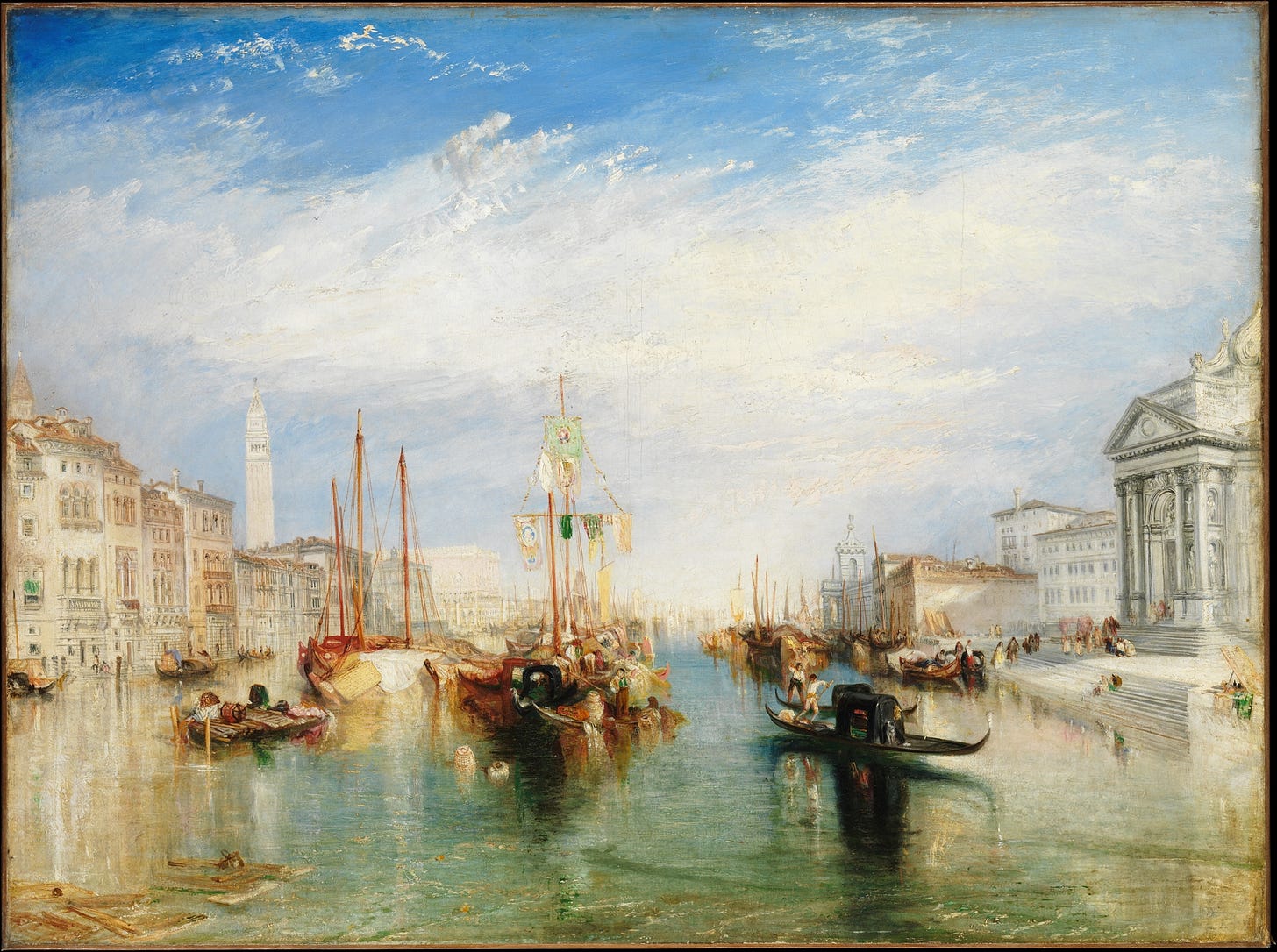
When writing this, my visits to the Tate in London come to mind, where I saw Turner's "The Shipwreck." It's celebrated by art historians, but I find it overly dramatic, like many of his shipping paintings. I prefer the much more quiet, lighter, and dreamy "Venice, from the Porch of Madonna della Salute" in the Met in NYC.
Nature's Resilience and Human Compassion
Animals continue to surprise me with their resilience and determination. In Tennessee, a zebra named Ed has been on the run for a week after escaping from his owner's property in Christiana. Originally purchased from a Texas breeder and brought home just days earlier, Ed became an internet sensation as he dashed through neighborhoods, forced highway closures, and evaded capture teams using drones, trail cameras, and K-9 units. The family originally named him Zeke, but social media dubbed him Ed, and the name stuck. You can legally own a zebra in Tennessee as a Class III animal, though experts note they "cannot be domesticated" and are "unpredictable"—a point Ed has been proving spectacularly for the past week (📹 weslittledrums_weslove).
Meanwhile, in Florida, an adolescent loggerhead sea turtle named Dilly Dally just returned to the Atlantic Ocean after losing her right front flipper to a predator attack. Rescued in January, she underwent amputation and five months of rehabilitation at the Loggerhead Marinelife Center in Juno Beach. Now swimming with three flippers, she has a satellite tracker attached to monitor her movements and see how amputation affects her migration patterns. "Every time we can release a turtle back into the wild is special," said one researcher. All sea turtles are endangered or threatened species, so every life saved counts for the species.
From individual animal rescues to protecting entire ocean ecosystems, Samoa just enacted one of the world's most ambitious marine protection plans. The country now protects 30% of its ocean—35,936 square kilometers, roughly the size of Taiwan—through nine new marine protected areas. The plan prohibits fishing, mining, and drilling in these zones, which include a humpback whale migration route and habitats for critically endangered hawksbill sea turtles, spinner dolphins, and blue sharks. One traditional fishing guide said it perfectly: "Sure, you're deprived of fishing in those particular areas, but it's giving a chance to the fish life in those areas to breed and multiply."
Just for Fun: Community Pencil Sharpening
Meanwhile, in Minneapolis, hundreds of people will gather Saturday for the annual sharpening of a 20-foot-tall No. 2 pencil. John and Amy Higgins had the giant pencil sculpted from an oak tree damaged in a storm, transforming neighborhood loss into community celebration. The pencil gets shorter each year—they've taken 3 to 10 inches off annually—but that's part of the magic. "Like any ritual, you've got to sacrifice something," said the wood sculptor. This year features Swiss alphorn players and purple pencils handed out in honor of Prince on what would have been his 67th birthday. Some attendees dress as pencils or erasers. As the writer of Daybreak Notes & Beans, I can appreciate a joyful annual celebration of the classic note-taking tool.
Finding Balance in the Weekend Mix
On the weekends, I love to step back from the daily chaos and notice what's actually happening in the world. While politicians destroy each other's fortunes and reputations, children survive in unprecedented numbers, scientists develop better blood tests, and communities gather to sharpen giant pencils.
This was the week when Ed the zebra chose to forget about life's constraints and decided to choose freedom. And Dilly Dally regained her freedom; losing a flipper didn't stop her from returning to the ocean. And while in Trump's U.S. environmental regulations are thrown overboard, Samoa proved this week that small nations can lead on protecting what matters most.
The contrast between Turner's dramatic shipwrecks and his peaceful Venice paintings feels fitting. We can acknowledge life's storms while still appreciating the quiet, lighter moments that make existence worthwhile.
Daybreak Notes & Beans delivers hope over despair and progress over panic. Your subscription supports independent journalism that refuses to surrender to negativity. I focus on stories of human ingenuity, conservation wins, and communities that gather to celebrate 20-foot pencils. Hit this button if these weekend reflections brighten your Saturday morning:
Until Monday's brew, ☕️
Alexander
If you missed yesterday’s Daybreak:
The Epic Meltdown of Democracy's Most Dangerous Alliance
Today marks 81 years since American and other Allied troops stormed the beaches of Normandy to liberate Europe from fascism. Who could have predicted that eight decades later, Europeans would watch in horror as America pushed the self-destruct button by democratically voting for a president now delivering the American-branded version of the very fascism…
Still here?
When I travel, there is often something extra to enjoy on Patreon:
Or perhaps you liked the article and want to support my writing by buying me a coffee?
Notes
MAGA Infighting: Salon via inkl, "Bannon urges Trump to deport Musk"
MAGA Infighting: Salon via inkl, "Musk suffers massive wealth loss in feud"
MAGA Infighting: The Guardian via inkl, "Musk and Trump are enemies made for each other"
Child Mortality: Our World in Data, "Less than 200 years ago, one in three Dutch children died before the age of five"
Alzheimer's: The Guardian, "Alzheimer's blood test can spot people with early symptoms, study suggests"
Healthy Breakfast: The Independent via inkl, "Cardiologist reveals his 'go-to' breakfast for a healthy heart"
Amsterdam Art: NBC News, "200-year-old condom featuring erotic art goes on display in Amsterdam museum"
Turner Painting: Euronews, "Turner's earliest exhibited oil painting is up for auction after disappearing for 150 years"
Shipwreck: BBC News, "Shipwreck mystery solved after nearly 140 years"
Zebra: Multiple sources, "Zebra on the run in Tennessee"
Sea Turtle: NPR, "Sea turtle Dilly Dally released into the ocean with three flippers after undergoing amputation"
Samoa Ocean: Mongabay, "Samoa's new marine spatial plan protects 30% of the country's ocean"
Giant Pencil: Associated Press, "Why a Minneapolis neighborhood sharpens a giant pencil every year"

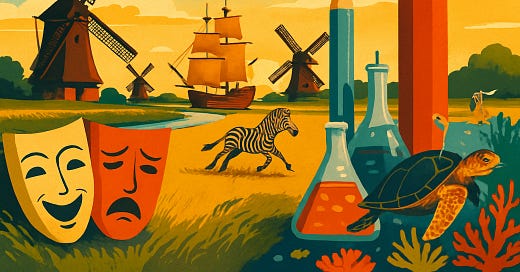




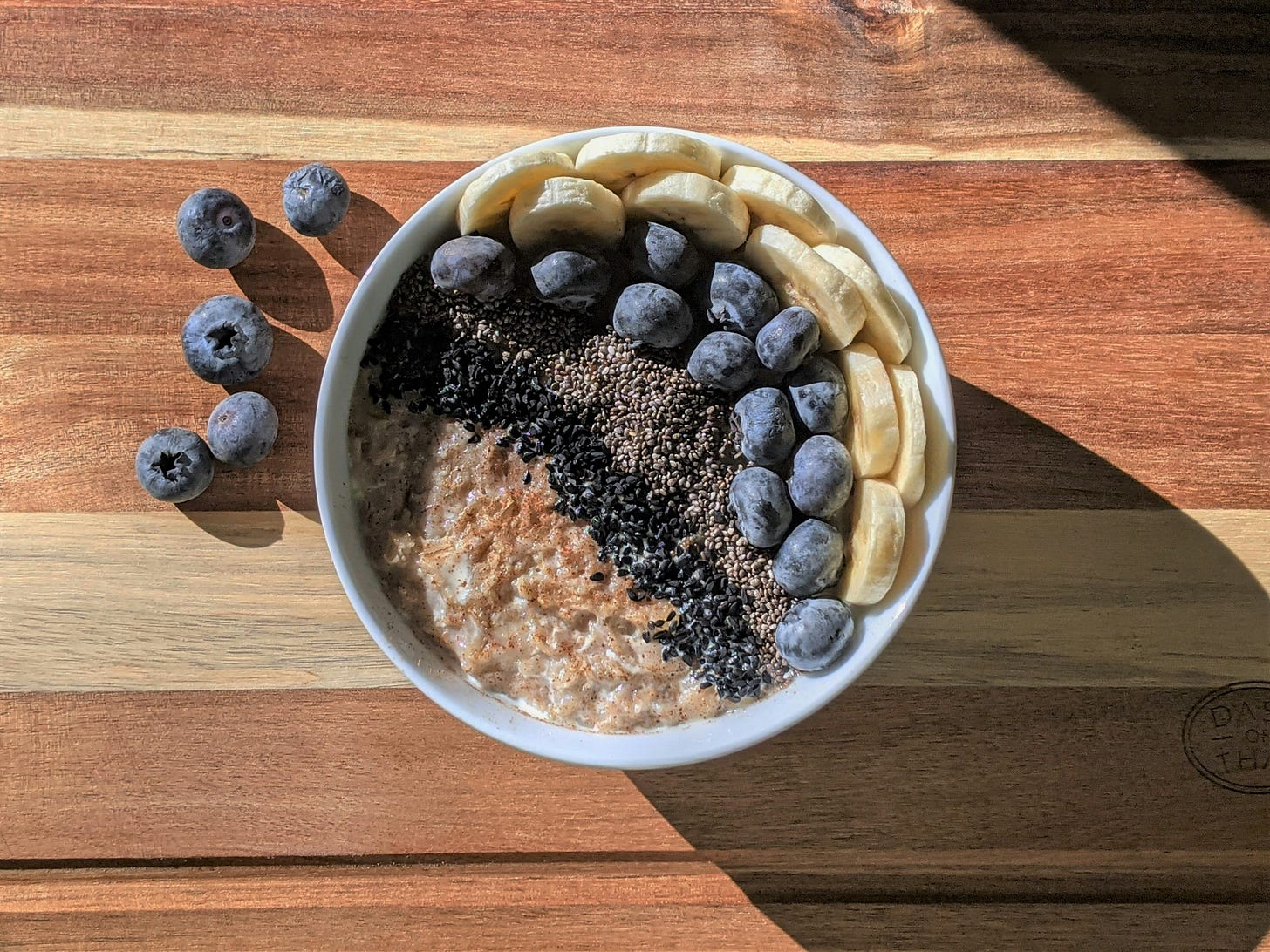
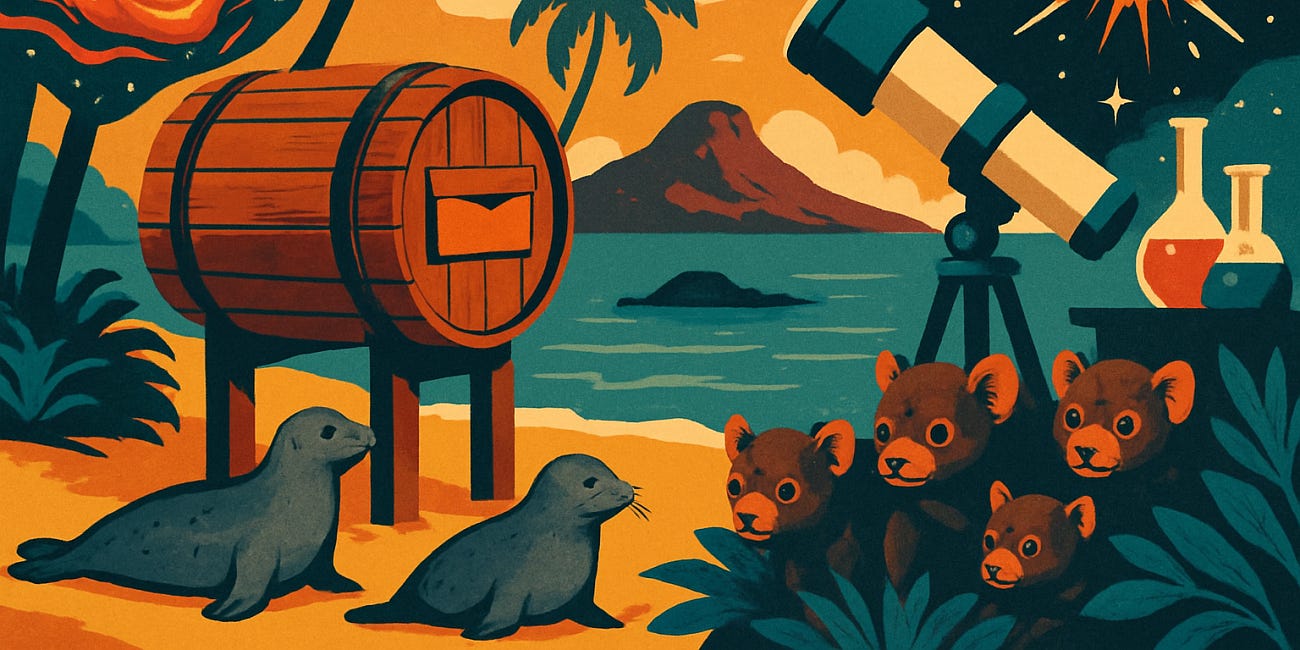
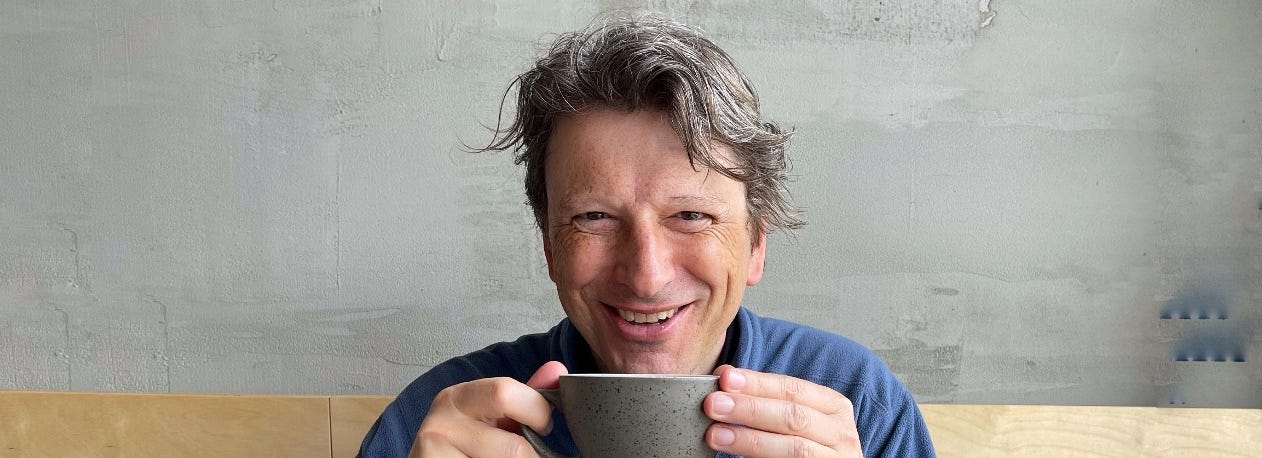
Also smugly enjoying the story of my breakfast. This is a delightful collection of weekend news beginning with the 200 year old "playful prophylactic" and the test for Alzheimer's, animal stories of Zebra Ed, Dilly Dally the sea turtle, Samoa's marine protection, and a 20 ft tall No. 2 pencil. We make the good days every day! ☕
Run, Ed, run!